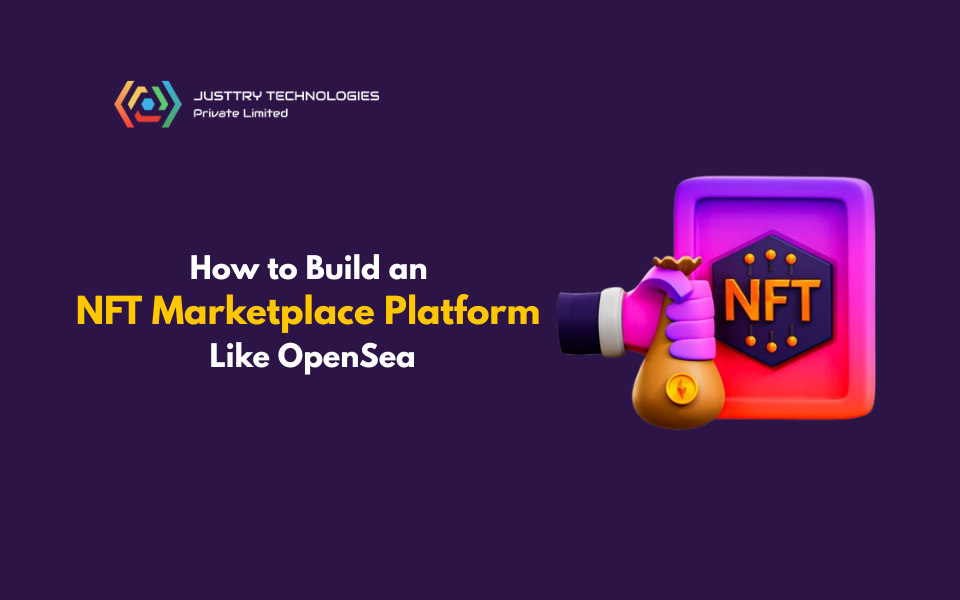How to Build an NFT Marketplace Platform Like OpenSea

Introduction
The digital world is changing fast, and NFTs (Non-Fungible Tokens) are at the heart of this change. Business owners, entrepreneurs, and creators are searching for ways to build platforms like OpenSea to connect with collectors and generate new revenue. The demand for NFT Marketplace Development Services is growing because such platforms allow users to trade unique digital assets with security, transparency, and speed.
Building your own NFT marketplace may seem complex, but with the right strategy, tools, and guidance, you can create a successful business in this booming industry. Let’s walk through how you can design and launch an NFT marketplace like OpenSea.
Key Features of OpenSea-Style NFT Marketplaces
An NFT marketplace must be easy to use, secure, and scalable. If your platform lacks these elements, users will move elsewhere. Here are some must-have features:
- User-Friendly Dashboard: Buyers and sellers should navigate with ease.
- Advanced Search and Filters: Helps collectors find specific NFTs quickly.
- NFT Minting Options: Artists and creators should be able to create and list NFTs easily.
- Wallet Integration: Essential for secure payments and seamless transactions.
- Auction and Bidding Systems: Engage users and boost sales.
- Decentralized Storage: Keeps NFTs secure and tamper-proof.
- Royalty Management: Supports creators with ongoing revenue.
These features are the backbone of platforms like OpenSea, ensuring trust and growth in the NFT space.
Step-by-Step Process to Build an NFT Marketplace Like OpenSea
Creating an NFT marketplace requires a structured approach. Let’s explore the essential steps.
Step 1: Designing an Intuitive UI/UX for Your NFT Marketplace
A clean and intuitive design builds trust. Users should easily browse categories, search collections, and manage their profiles. Simple interfaces mean less confusion and more engagement.
Step 2: Choose the Blockchain Network
The choice of blockchain defines your platform’s speed, cost, and scalability. Ethereum is widely used, but many businesses also prefer Solana, Polygon, or Binance Smart Chain. The right blockchain depends on your business goals and user base.
Step 3: Developing Smart Contracts for Secure NFT Transactions
Smart contracts automate transactions and ensure fairness. They protect users against fraud and give creators confidence that royalties will be paid on every resale.
Step 4: NFT Minting Module
Creators should be able to mint NFTs with minimal steps. An easy minting process attracts more artists and keeps your platform active with new collections.
Step 5: Implementing Wallet Integration and Payment Systems
Your NFT marketplace must support popular crypto wallets like MetaMask, Trust Wallet, and Coinbase Wallet. Adding payment gateways also helps users who are new to crypto.
Step 6: Building Backend Infrastructure with Decentralized Storage
NFTs are unique digital assets. Storing them securely with decentralized storage like IPFS ensures safety and transparency. This adds credibility to your marketplace.
Step 7: Testing, Deployment, and Ongoing Platform Management
Before launch, test every feature carefully. Check the minting process, wallet connections, and transaction flows. After deployment, continuous monitoring is needed for updates, bug fixes, and smooth performance.
Monetization Strategies and Future of NFT Marketplaces
A successful NFT marketplace must generate sustainable revenue. Popular monetization strategies include:
- Transaction fees on every trade.
- Listing fees for creators to showcase NFTs.
- Premium membership with added benefits.
- Featured NFT promotions.
The future of NFT marketplaces looks promising, especially with white label NFT marketplace development solutions that allow businesses to launch platforms faster. With growing adoption across industries like music, gaming, fashion, and real estate, opportunities are endless.
Why Choose a Professional Development Company
Building an NFT marketplace is not just about coding. It requires expertise in blockchain, design, and scalability. Working with an NFT Marketplace Development Company ensures your platform is secure, user-friendly, and ready to grow. Professionals handle smart contracts, wallet integrations, and testing, saving you time and costly mistakes. For business leaders, this means faster time-to-market and peace of mind.
Conclusion
NFT marketplaces are shaping the future of digital trade, and creating one like OpenSea requires planning, the right technology, and expert support. Partnering with the right team makes the journey smoother. Justtry Technologies is a leading Blockchain Development Company that provides end-to-end NFT marketplace development and white label NFT marketplace solutions. With their expertise, you can build a scalable, secure, and profitable NFT business that connects with today’s digital-first audience.
- Questions and Answers
- Opinion
- Motivational and Inspiring Story
- Technology
- Live and Let live
- Focus
- Geopolitics
- Military-Arms/Equipment
- Безопасность
- Economy
- Beasts of Nations
- Machine Tools-The “Mother Industry”
- Art
- Causes
- Crafts
- Dance
- Drinks
- Film/Movie
- Fitness
- Food
- Игры
- Gardening
- Health
- Главная
- Literature
- Music
- Networking
- Другое
- Party
- Religion
- Shopping
- Sports
- Theater
- Health and Wellness
- News
- Culture

